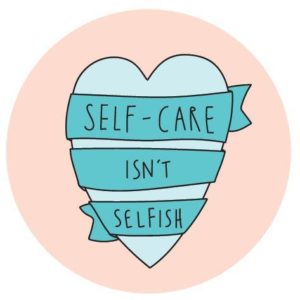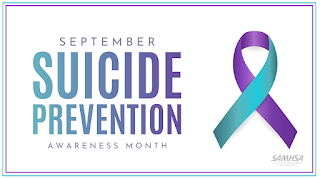Self-Care During a Pandemic: A Marathon, Not a Sprint
We recently discovered this article on the Psychology Today website entitled "Self Care and COVID-19: Getting Ready for the Marathon." Planning and preparing for the long-term is such a great strategy in uncertain times. The author, Dr. Doreen Dodgen-Magee, writes that "intentional planning goes a long way to staying mentally healthy amid a crisis."
Our educators, parents and students are scrambling right now to establish a new "normal." Support systems that may have been in place through family gatherings, religious services, athletic teams or other social opportunities have been severely limited in this new era of social distancing. Now is the time to make sure that your self-care toolkit is well-stocked, as none of us know exactly how long this crisis may last. As Dr. Dodgen-Magee writes, "Just as we’re washing our hands, resisting touching our faces, and keeping 6 feet between us, it’s important to tend to our mental hygiene."
The CDC has published an article on "Managing Stress and Anxiety" during this COVID-19 outbreak. The advice to "create a menu of personal self-care activities that you enjoy, such as spending time with friends and family, exercising, or reading a book" aligns perfectly with Dr. Dodgen-Magee's idea of developing a self-care plan NOW that you can turn to later, if events begin to feel even more challenging.
In this article, you can find some tips on "bite-sized acts of self-care" (what a great phrase!), including the following:
That last bullet refers to a "conscious uncoupling" (to borrow a phrase from Gwyneth Paltrow) from the neverending stream of information that surrounds us. It's important to stay informed, but it's also important to take digital breaks, so that we can safeguard our emotional well-being. Perhaps scheduling media updates can help with finding balance. For example, have a plan to visit one or two trusted websites or news apps only at a certain time of day and resist checking those "breaking news" updates every time your phone pings.
We love this Twitter post of "Daily Quarantine Questions" from @teachergoals:
To help you develop your own COVID-19 Self-Care Toolkit, here are some additional resources:
We will leave you with a quote from that last article:
"Self-care is not selfish or indulgent - it's how we keep ourselves well to ensure we are physically, emotionally, and mentally capable of being there for our young children."
...and some excellent self-care advice from the CDC! 😀
Our educators, parents and students are scrambling right now to establish a new "normal." Support systems that may have been in place through family gatherings, religious services, athletic teams or other social opportunities have been severely limited in this new era of social distancing. Now is the time to make sure that your self-care toolkit is well-stocked, as none of us know exactly how long this crisis may last. As Dr. Dodgen-Magee writes, "Just as we’re washing our hands, resisting touching our faces, and keeping 6 feet between us, it’s important to tend to our mental hygiene."
The CDC has published an article on "Managing Stress and Anxiety" during this COVID-19 outbreak. The advice to "create a menu of personal self-care activities that you enjoy, such as spending time with friends and family, exercising, or reading a book" aligns perfectly with Dr. Dodgen-Magee's idea of developing a self-care plan NOW that you can turn to later, if events begin to feel even more challenging.
In this article, you can find some tips on "bite-sized acts of self-care" (what a great phrase!), including the following:
- "Number one: Take five minutes in quiet to just breathe. Focus on your breathing and nothing else; let go of any unwelcome thoughts that pop up.
- Number two: Play a song and just dance. No further explanation necessary, just enjoy it.
- Number three: Take a longer than typical shower and relish the sensations it provides.
- Number four: Practice the DBT technique of half-smiling and willing hands. Sit or stand with your arms relaxed at your side and your palms turned outward. Relax your face and turn the corners of your mouth slightly upward. Now notice that it becomes more difficult to hold on to frustration, anxiety, and other difficult emotions.
- And lastly, number five: Turn off your phone."
That last bullet refers to a "conscious uncoupling" (to borrow a phrase from Gwyneth Paltrow) from the neverending stream of information that surrounds us. It's important to stay informed, but it's also important to take digital breaks, so that we can safeguard our emotional well-being. Perhaps scheduling media updates can help with finding balance. For example, have a plan to visit one or two trusted websites or news apps only at a certain time of day and resist checking those "breaking news" updates every time your phone pings.
We love this Twitter post of "Daily Quarantine Questions" from @teachergoals:
To help you develop your own COVID-19 Self-Care Toolkit, here are some additional resources:
- "How to Practice Self-Care During the Coronavirus"
- "Being Mindful of Your Mental Health During the COVID-19 Outbreak"
- "Self-Care in the Time of Coronavirus"
- "How to Keep Your Cool With Your Kids When You Are All Cooped Up Together"
- "How to Care for Yourself While Practicing Physical Distancing"
- "Young Children at Home during the COVID-19 Outbreak: The Importance of Self-Care"
We will leave you with a quote from that last article:
"Self-care is not selfish or indulgent - it's how we keep ourselves well to ensure we are physically, emotionally, and mentally capable of being there for our young children."
...and some excellent self-care advice from the CDC! 😀







Comments
Post a Comment